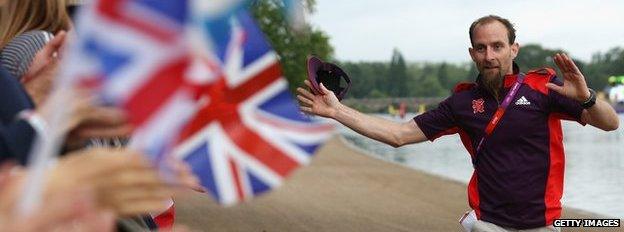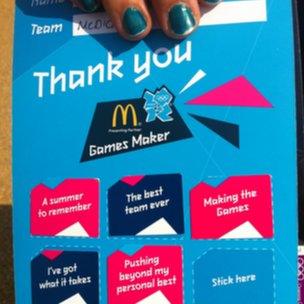London Olympics: How volunteers made the Games
- Published

As two weeks of helping to make the Games and herding the crowds come to a close, how has life been for Olympics volunteers?
"I've said I'm going to get buried in my uniform, when the time comes," says Kirsten, a volunteer at the Olympic Games.
That's a pair of London 2012-emblazoned chinos, a purple and red polyester shirt, regulation bag, hat, jacket, brolly and trainers that she is signing up to as the eternal outfit.
One volunteer has become a unlikely internet star, after showing her very British sense of humour
Such is the enthusiasm of the 70,000 "Games Makers" who have staffed venues, directed the lost and inattentive, mended grazes and helped make the sport happen on the field of play.
Visit London at the moment and they are easily spotted in that distinctive get-up.
The first sound people hear before they even arrive at a venue or Olympic Park is from the volunteers. The ones working what some call "the plum job", up above the crowd on high seats, lifting the mood.
They put shouts out to countries, Tube lines, for athletes that fans might worship. They check if anyone is "excited yet" today.
In a way it is so un-British. Ebullient, noisy, interactive - rather than reserved. But they are also dry and witty.
The volunteers should be nominated for the BBC's Sports Personality Team of the Year award for the vital role they have played, the British Olympic Association's chairman Colin Moynihan has said.
Games organisers Locog can't praise them enough. And there is a Twitter campaign to recognise their efforts under the hashtag #bigupthevolunteers. There are also London Ambassadors working across the city.
So how has it been for them, to give up a minimum of 10 days with no pay, no expenses, no accommodation, for some, sleeping in a bunk at a makeshift campsite?
"It has been absolutely amazing," says Margaret Singer, a speech and language therapist from Aberdeenshire.
She is a first-responder (first-aider) at the BMX track, built in the lee of the velodrome. She has worked at both venues treating minor ailments - mending trapped fingers, medicating headaches.
Does she mind having spent about £500 on fares to come south for training in the lead-up to and for the Olympics themselves?
"No, it's on the bucket list, one of the things you should do, go to the Olympic Games. I wanted to be part of it," she smiles.

Volunteers are rewarded with pins and stickers
The volunteers have many different jobs such as venue assistance, transport and medical support.
Massaging the world's greatest athletes doesn't sound like a bad gig. Across at the Olympic Stadium, Mike Whittaker has spent the day manipulating the tired muscles of up to 20 competitors "from the little fast guys to the big hammer throwers". The famous and the unknown have laid on his table.
He is a local PE teacher and a coach at Newham and Essex Beagles, the home club of 2012 Olympians like Mo Farah, Christine Ohuruogu and Chris Tomlinson. Working at the venue, he says simply, is "heaven".
"It's going to be a terrible loss and a massive gap in everybody's lives when it ends," he says. "It'll be very strange not getting up at 4.30 in the morning and getting home at midnight from this."
It's clear as you explore the park that not every volunteer has lucked out in the best role. Games Maker stewards are standing with their backs to the action, watching the crowd instead. Many are found out the back or down in the bowels of venues, endlessly opening the same door for people passing through.
The job they have may not make best use of their skills and brainpower - a maths graduate is checking tickets and helping with enquiries at the Basketball Arena. A teacher from nearby Woodford Green has what he calls a "pen and clipboard" job ticking swimmers on and off the bus at the practice pools at Eton Manor.
In material terms they have just pin badges and stickers on their passes to show for their efforts. Some will give yet more time to staff the Paralympics.
But volunteers are one of the factors that have so far made the Games a success. It is a formula partly forged in 2000 when Sydneysiders took on the idea of welcoming the world to their city.
Park visitors say they make the difference. "They are just everywhere to help, so it's great," says Mel Lewis. "They make the atmosphere fantastic," says Laura Wise, as they walk to the stadium for a night of athletics.
And they are making their families beam. "I am so proud of her, that she does something so unbelievably emotional as her job and then comes here as a volunteer, it's a lot to do," says Wendy Morgan, of her intensive care nurse turned volunteer daughter Laura.
One volunteer was praised by a spectator for the help she gave to her children when her husband was taken ill at the Games.
In a sea of people near the Stratford entrance gates to the Park, a stricken Bo Chapman has just been reunited with her lost child.
That's thanks to Matthew Blakley, a Games Maker from Whitley Bay who during the Olympics is sleeping on a squeaky inflatable bed on his cousin's floor.
"I'm here," he says, "to make sure everyone I interact with goes away with an improved experience.
"I'm living the dream."